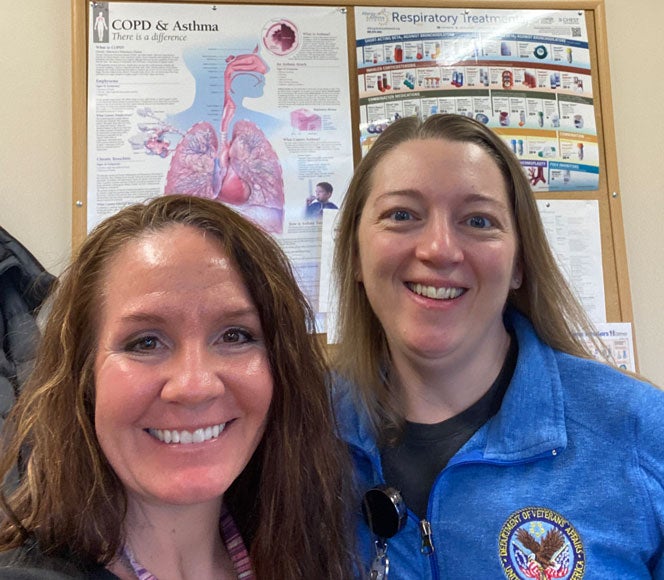
Amanda Bashista spends her days surrounded by COHS graduates — and many Broncos — at the Boise Veterans Affairs Medical Center.
Bashista, who received her bachelor’s degree in respiratory care in 2002, works as an outpatient respiratory care coordinator and an adjunct faculty member for Boise State’s Department of Respiratory Care. Earlier in her career, she worked in inpatient respiratory care at Saint Alphonsus and at the VA; she has been involved in outpatient care since 2008.
Of the respiratory care specialists at the VA across inpatient, outpatient and pulmonary function areas, she estimates that about 60 percent have a Boise State background. She is responsible for case management for about 1,600 patients with acute and chronic lung disease, neuromuscular disease and sleep apnea. She generally sees or consults on 15 to 20 patients per day; at that scale, it’s not hard to see what an impact she and other Boise State and COHS grads are having on the population, and very specifically, the population of the area’s veterans and their families — including a fair number who also graduated from Boise State.
And she’d be the first to say what a difference COHS, and Boise State make.
“I think that my education gave me a strong foundation and prepared me for anything,” Bashista said, adding that the foundation she and other COHS grads had became very clear during the pandemic, when they, and so many others, needed to get creative to meet patient and family needs.
“You have to be a MacGyver when you are a respiratory therapist,” she noted, referencing the classic television series and its hero. “This is the theory taught from the beginning. The Boise State respiratory care program focused on teaching its students critical thinking skills combined with extensive knowledge of the cardiopulmonary system. You can’t be limited by the equipment, or ‘If we have the equipment or the resources to do it.’ Our training taught us to figure it out.”
Prioritizing patients, she said, is job one. At the Boise VA, there’s a solid Bronco front line that is doing that. And it’s critical, given the complex patients that they see, including a growing number of Vietnam veterans and a growing population that needs their care.

“I work 6 feet away from someone I went to RT school with and we’re lifelong friends. We think along the same lines, we have the same wants and needs and compassion for our patients …” Bashista said. “That’s our main goal, to help our patients with their quality of life.”
That COHS spirit extends outward as well. Many have families, with children in area schools, and VA COHS team members are actively involved in the community. At the college, Bashista and many other professionals make sure that current students receive the same, current, rigorous education they got.
Serving as an adjunct faculty member, Bashista said, also has made her better at her job, helping her to stay current in clinical and assessment skills and improving her own care, while she models for upcoming respiratory care professionals how they, too, can have lifelong careers in health care.
“You have to want to do it and to enjoy it to do it,” she said. “I think, because we understand that, we do a significantly better job understanding our patient’s individual needs.”